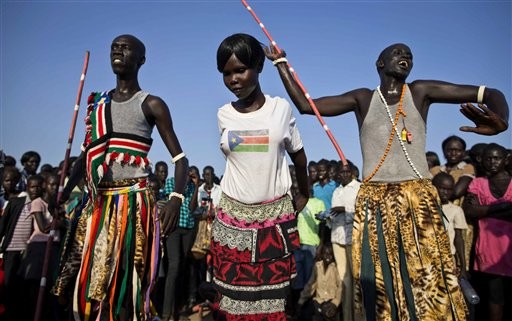Groups of dancers in Abyei are increasingly singing in languages other than their own, saying that they need to promote the cultures of other tribes in Sudan and South Sudan, not just Dinka. But the trend is worrying to some of the Dinka Ngok elders.
There are five folklore dance groups in Abyei – four for young people and one for adults. The adult group sings in Dinka, but the others also use languages such as Shilluk, Acholi, Jur-Chol and Nuer.
Abyei Today reported that Dinka Ngok elders are responding to this trend by calling on folklore dancers to sing songs only in their mother tongue in order to reflect their culture. They say the Dinka Ngok ways of living are likely to disappear if young people continue to ignore them.
The Africa Dance group was founded by William Garang, from Kuajok. He admitted that members were weakest in performing songs in Dinka, and he invited a Dinka elder to volunteer to teach the group local songs.
16-year-old Ajak Achuil, a member of the Africa Dance group, said it was important to sing in the language of the area where they were appearing, to help preserve local culture.
Abyei Today also quoted Aluel Majok, a poet and a singer of traditional Dinka songs, saying that Dinka Ngok traditions were at risk because people had been scattered during years of conflict, and found it difficult to come together to preserve them.
She encouraged young people to practise Dinka Ngok dances such as Ayuat Tuang. A song composer, Ajeich Makuach told us he was ready to teach any dance group that wanted to learn Dinka Ngok songs.
File photo




